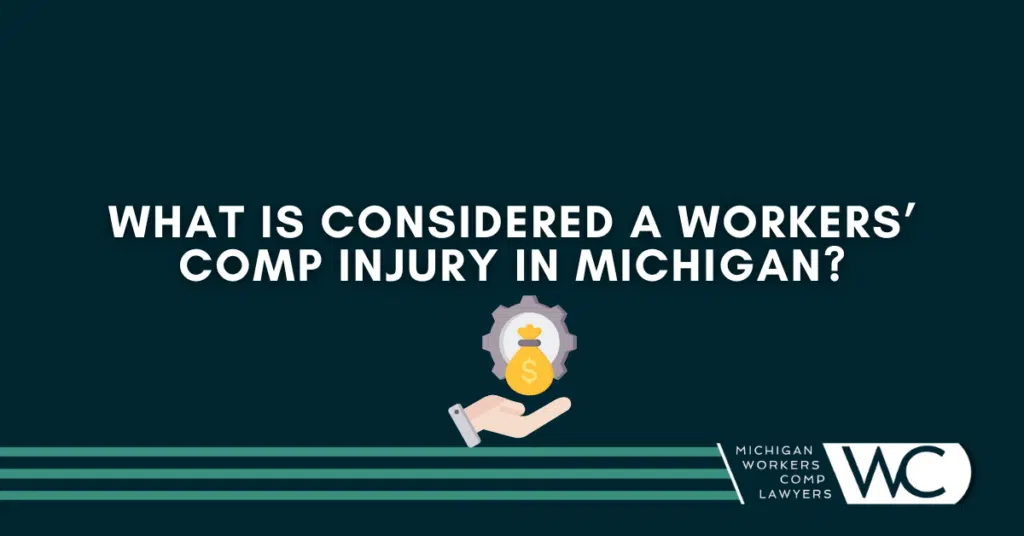
Michigan workers’ compensation lawyer explains the difference between specific injury and occupational disease.
Many injured employees in Michigan call our office asking “what is considered a workers’ compensation injury?” Many don’t even know that they can be covered under Michigan workers’ compensation law. We believe knowledge is power and want we want injured employees to know their legal rights. If you are wondering what is considered a workers’ compensation injury in Michigan then you have come to the right place. But before we dig in lets start with the basics.
What is Michigan Workers’ Comp Law?
Michigan workers’ comp law protects employees hurt on-the-job. It covers all medical treatment without copays or deductibles. It also pays lost wages to employees who are unable to work.
Vocational rehabilitation can help disabled employees’ transition to a new career. These workers’ comp benefits are guaranteed regardless of employee fault and it is considered a safety net.
What Is Considered A Workers’ Compensation Injury?
In Michigan, there are two broad categories that are considered a workers’ compensation injury; specific injury and occupational diseases.
What Is A Specific Injury?
In Michigan, a specific injury is considered a workers’ compensation injury that involves a sudden trauma. A classic example is the standard dropping a hammer on your foot type accident.
In Michigan, other specific injuries that are considered workers’ compensation injuries include lifting a heavy item resulting in a herniated lumbar disc, twisting a knee causing a torn meniscus, throwing overhead and tearing a rotator cuff, or catching a finger in a machine resulting in amputation.
Proving A Specific Injury
Proving a specific injury involves timely workplace reporting, seeing a doctor right away, and work restrictions. Many of these claims are paid without controversy. Disputes usually arise after an employee has been on workers’ comp for a period of weeks or months. Insurance company doctors will say an employee has fully recovered, no future medical treatment is needed, and he or she can work unrestricted.
What Is An Occupational Disease?
In Michigan, an occupational disease is considered a workers’ compensation injury that shows up from repetitive work activities or exposure to chemicals.
An employee could develop chronic pain symptoms in their hands, wrists, arms, knees, shoulders, or lumbar/cervical spine. Some employees develop trouble breathing or allergies.
Other occupational diseases include carpal tunnel syndrome, cubital tunnel syndrome, radial tunnel syndrome, epicondylitis, rotator cuff tearing, spinal disc disease, sciatica, lumbago, asbestosis, mesothelioma, lead poisoning, skin disorders, asthma, heart attack, and hearing loss.
Proving An Occupational Disease
Proving an occupational disease claim under workers’ comp is more challenging. It requires a more difficult showing of medical causation. This is especially difficult if an employee has a preexisting condition. An underlying change of pathology will typically need to be proved. Watch out for insurance company doctors who blame all symptoms on arthritis or some other degenerative medical condition.
An employee who finds their workers’ comp benefits disputed should contact an experienced lawyer. It is possible to file an Application for Mediation or Hearing seeking additional workers’ comp benefits. A neutral magistrate will review the medical evidence, including treating doctors, and issue a ruling granting or denying payment. There will never be a fee unless an employee successfully receives additional workers’ comp benefits.
Need help with your workers’ compensation injury in Michigan? Contact lawyers now for a free consultation!
If you are an employee who was injured on the job and need help with your workers’ comp claim, call now to speak with an experienced attorney, or fill out our contact form for a free consultation. There is absolutely no cost or obligation. We’re here for you.
Our attorneys have been exclusively helping injured workers in Michigan for more than 40 years and can help you better understand workers’ comp laws and explain what happens if you have been hurt on the job.
To see what our own clients have to say about the caring, compassion, and communication they received from us, you can read in their own words about their experience here on our testimonials page from clients we have helped.
Michigan Workers Comp Lawyers never charges a fee to evaluate a potential case. Our law firm has represented injured and disabled workers exclusively for more than 40 years. Call (844) 316-8033 for a free consultation today.
Related information:


